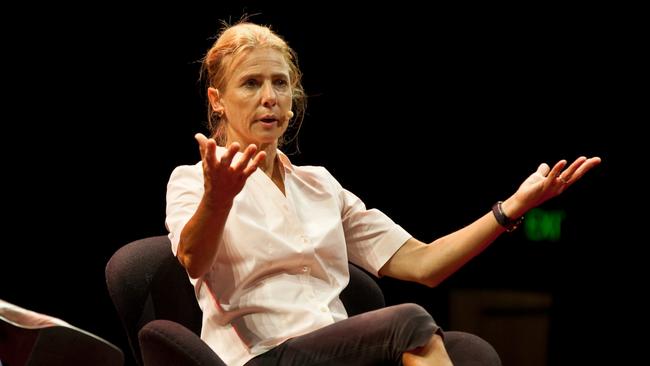It is unjust to criticise Lionel Shriver for what she hasn’t said
Virtue-signallers hold themselves up to ridicule in their haste to condemn all those who do not share their narrow-minded ideas.

Lionel Shriver is a writer who says controversial things. She did so at the Brisbane Writers Festival a few years back; she has done so again, in an essay in The Spectator this month.
What did she say this time?
I won’t keep you waiting because, honestly, it’s actually what she didn’t say that matters.
Shriver took aim at an email sent out by the international publisher Penguin Random House that signs it up to a new, company-wide goal for diversity. By 2025 — that’s just seven years away, for those readers with dominant right brains — Penguin Random House wants “both our new hires and authors to reflect UK society”.
What does this mean?
It means the company is “drunk on virtue”, according to Shriver. “I’d been suffering under the misguided illusion that the purpose of mainstream publishers like Penguin Random House was to sell and promote fine writing.”
Instead, a manuscript written by “a gay transgender Caribbean who dropped out of school at seven and powers around town on a mobility scooter” was now very likely to be published by Penguin Random House, whether or not said manuscript was “an incoherent, tedious, meandering and insensible pile of mixed-paper recycling”. This is not necessarily so, but she’s making a point: Shriver is worried about the books that won’t get published because the writer doesn’t tick the right diversity boxes.
“Good luck with that business model,” she says. “Publishers may eschew standards, but readers will still have some.”
She didn’t stop there. Shriver, who won the 2005 Orange Prize for We Need to Talk About Kevin, also mocks the company’s new questionnaire for potential employees and writers, which includes questions such as: “How would you define your gender?” Instead of the old “M/F”, you may now tick “Prefer to use my own term”. Under race, you can choose “White: Gypsy or Irish Traveller”.
How has this essay been received? You can probably guess.
Until this week, Shriver had been due to judge the 10th Mslexia short story prize but Mslexia — it’s a British magazine for female writers — has rescinded her invitation. In a statement notable for the rather haughty language, the company says: “Following Lionel Shriver’s controversial comments on diversity in publishing, we have decided to remove her as the judge of our 2018 Short Story Competition.”
The statement goes on: “Since our launch in 1999, Mslexia’s raison d’etre has been to provide a safe space for all women writers to develop their craft. We actively encourage entries from marginalised writers and frequently draw attention to the issues they (we) face.
“Although we welcome open debate, Shriver’s comments are not consistent with Mslexia’s ethos, and alienate the very women we are trying to support.”
Probably it expected a round of hearty applause but thankfully it didn’t get one.
Even on Twitter, which leans very far left, people were appalled. Here’s one comment: “This is an attack on free speech … You’ve engaged in an act of censorship … History will not judge this period of shaming kindly at all.” And, what the hell, here’s one more: “If you say ANYTHING about diversity that even one person finds offensive, it seems you’re for the chop.”
Did Shriver deserve to get the boot? Look, the essay is pretty lame, and the jokes woeful, but obviously we should all stand very strongly against punishing Shriver for expressing an opinion.
But also — and this is much more important — we should stand strongly against punishing Shriver for what she absolutely did not say.
One example: this week a group called Write Now, which represents British writers from minority backgrounds, has published an “Open Letter to Lionel Shriver”.
In a nice bit of trickery, it says: “We are compelled to ask: does she truly believe that diverse writers are incapable of penning good books? (Or) that women of colour are incapable of working editorially? Does she believe that someone with a disability or from a working-class background does not have what it takes to grasp the concepts of plot, dialogue and language?”
See what they did there?
Nowhere in her essay did Shriver say any of that but, gee, they’ve come close to suggesting it.
The “open letter” goes on: “(Does she believe) that marketing is a job limited to individuals who identify as cis, white and straight?”
Well, we don’t know because nowhere did she say that.
The Guardian’s Chitra Ramaswamy made similar gibes, saying: “Lionel Shriver may not realise it, but greatness can come from anywhere.”
She never said otherwise.
It’s targets she’s worried about. Quotas.
Irish writer Ruth Dudley Edwards said on Twitter: “My friend Lionel Shriver is a fine writer and a fearless commentator who has been penalised for expressing her opinion.”
But actually, no. She’s likely been penalised for things she didn’t say, which isn’t necessarily worse, because it’s all awful. But the muddled response goes on.
The Guardian yesterday had an opinion piece by Peter Gordon, editor of Asian Review of Books in Hong Kong, which said of Shriver’s essay: “Without diversity the English literary world would not have Homer, Dostoevsky or Garcia Marquez.”
But wait …
Dostoevsky needed a leg up on the basis of race? I don’t think so.
Putting Homer aside, because his inclusion by Gordon was so silly in the first place, we are talking here about writers who got by on the gifts God gave them. On blazing talent, on grit, on determination; by finding readers, sometimes against all odds, in their own domains; and then in the English world, because they had something to say.
You think box-ticking is going to get you Dostoevsky? Garcia Marquez? Toni Morrison? Haruki Murakami? No. They’re coming all on their own.



